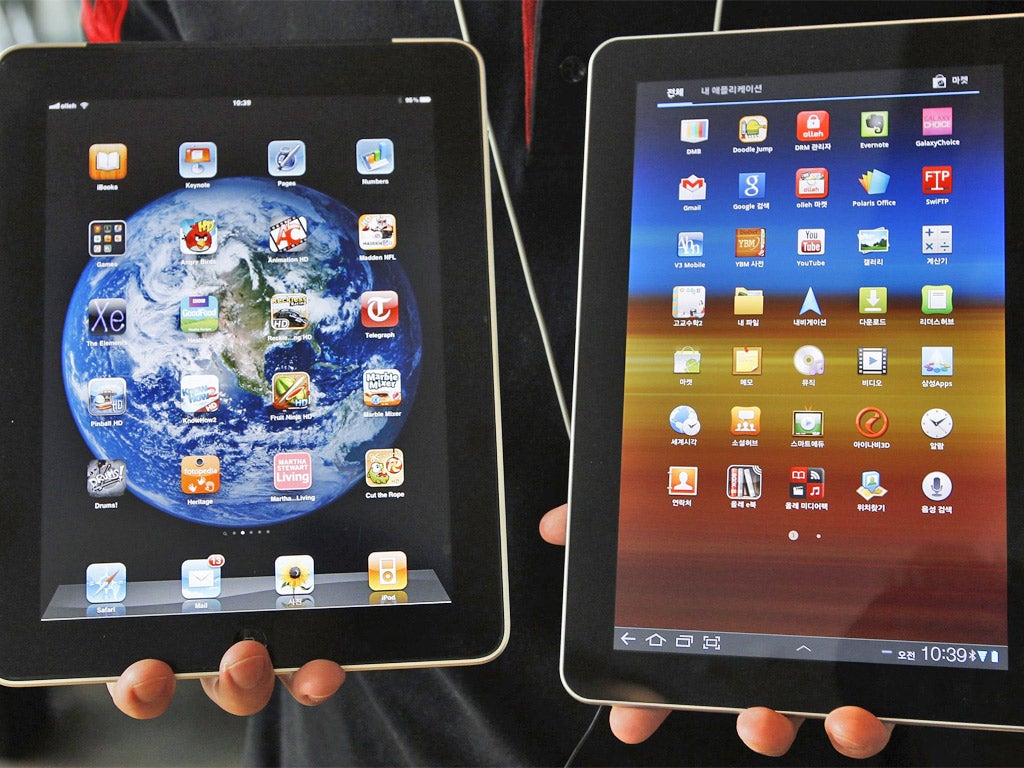Is the 'iPad killer' dead? Apple wins patent war with Samsung
US judge reinforces dominance of market by prohibiting sale of Galaxy tablets

Samsung, which has emerged as the biggest potential threat to Apple's dominance of the new market for tablet computers, has suffered a courtroom blow to its efforts to compete against the iPad after a US judge ruled it had to stop selling one of its range of Galaxy tablets because it was "virtually indistinguishable" from the Apple device.
The ruling was a victory for Apple in the latest legal skirmish between the two companies, who are engaged in a wide-ranging set of patent disputes across the world.
It also marked one of the first times that consumers will be affected by the so-called "patent wars" raging between all major makers of mobile devices. In most cases, the courts have allowed devices to stay on sale while the companies involved pursue their competing patent claims, and in many cases the disputes have led to multi-million dollar cross-licensing deals that keep both sides' products available.
US district Judge Lucy Koh told Samsung it would have to stop shipments of its first-generation Galaxy Tab 10.1 in the US because there was a high chance it infringed Apple's patents. "Although Samsung has a right to compete, it does not have a right to compete unfairly, by flooding the market with infringing products," she wrote in a judgement.
The South Korean firm reacted angrily to the ruling and said it would appeal. It said: "Apple sought a preliminary injunction of Samsung's Galaxy Tab 10.1 based on a single design patent that addressed just one aspect of the product's overall design. Should Apple continue to make legal claims based on such a generic design patent, design innovation and progress in the industry could be restricted."
Apple's patents on the iPad include one on its basic design, but Samsung says that there is nothing unique about the basic idea of a thin computer dominated by a large screen. Judge Koh's ruling does not stop retailers with existing stockpiles of the Galaxy Tab 10.1 from selling those, and it does not affect the second version of the device which Samsung unveiled last month.
Apple sold 13.6 million iPads in January-March to control 63 per cent of the global tablet market, according to research firm Display Search. Samsung sold 1.6 million tablets, giving it 7.5 per cent of the market. The global tablet market is set to nearly double this year to 123.5 million units, according to iSuppli.
The Galaxy Tab injunction comes less than a week after Apple suffered a serious setback when a federal judge in Chicago dismissed its patent claims against Google's Motorola Mobility unit. Judge Richard Posner ruled that an injunction barring the sale of Motorola smartphones would harm consumers.
Google moved into smartphone manufacturing last year with the acquisition of Motorola, which it actually bought not for its design skills but for its patent portfolio. The technology in a smartphone or a tablet computer may be covered by hundreds of patents, on everything from the chip technology inside to the look and feel of the user interface, including the way a touchscreen is swiped, and some industry observers have complained that many of the patents are overly broad and are making it harder for electronics manufacturers to make improvements.
Google enters tablet war with Kindle killer
Google became the latest of the giant technology companies to unveil a tablet computer, opening a new front in its growing rivalry with Apple.
The Nexus 7 is designed to usurp Amazon's Kindle range at the lower end of the market, and Google said prices would start at $199, less than half the price of Apple's iPad. The device, with a 7in touchscreen and running an updated version of Google's Android operating software, is being manufactured by Taiwan's Asus.
Google's move into branding and selling its own hardware comes a week after Microsoft unveiled its own hybrid PC-tablet device called Surface, which will come out later in the year.
Stephen Foley
Subscribe to Independent Premium to bookmark this article
Want to bookmark your favourite articles and stories to read or reference later? Start your Independent Premium subscription today.

Join our commenting forum
Join thought-provoking conversations, follow other Independent readers and see their replies